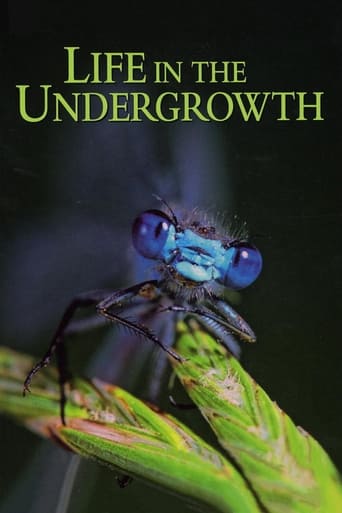David T
Attenborough's commentary seems a little unnecessary at times, however, I cannot praise the fine camera work enough, just so beautifully done and so wonderful in capturing the luscious colours of The Undergrowth. Each segment is wonderful yet I yearned for more. If you love colour and form this will amaze you. The sound track, too is very fine, gorgeous. I had no real idea that the plant and insect kingdoms were so interlocked, the scientists that. I assume, provided the technical data must be congratulated. Had my lessons in Biology been this interesting I might've paid more attention. If you get the jitters looking at bugs, then this probably will upset!
herfancy
I've seen several of David Attenborough's documentaries and have always found myself describing them with many superlatives. Whilst this documentary presented some marvellous filming and was quite informative, I was very disappointed with David's direct interaction with our fellow creatures in the undergrowth. I believe the most important tenet in documenting wildlife is to take a purely observational role without interacting. If something cannot be shown without interfering then it should not be shown. Yet in this documentary we have David picking up a horseshoe crab, touching insects with pins, picking up worm cocoons. I expected much better.
gologo112
I am not much into this kind of stuff: worms, snails,spiders etc. but "Life in the undergrowth" has really enchanted me! A superb, captivating and informative storytelling,breathtaking scenes of a world beyond our natural perceptions and the genius of Attenborough: this is what the 5 episodes are about. It is astonishing how the new technologies can reveal the everyday life of creatures that we usually think of being too primitive to deserve our attention and interest. However, the actors in this series have roles in the complex interplay called life as important as ours or maybe even more. The solutions they found regarding their survival, reproduction and adaptation are really amazing, though in many senses completely different to what we are accustomed to in the macro-world.
Anton Petrov
This is an ingenious documentary about creatures of this world we often forget exist. It features amazing camera work, incredibly realistic, life like colours, mesmerizing scenes, good selection of music and even a sort of a storyline like progression for each episode that make this mini TV series by far the best wildlife documentary I have ever seen. David Attenborough doesn't just make us clearly understand the complexities of life in general, but also relates many things that we witness to human experience. Struggle, formation of societies, communication and continuity of life are amongst the main ideas he presents, but espionage, war, theft, deceit and even anarchy, and breakdown of order are also present. He really does go far and wide to present us with an extremely rich experience of the miniature world beneath our feet. Such an incredible amount of footage from all over the world, shot with such an incredible skill left me amazed. I couldn't wait to get my hands on more of his movies, just to see what else I could learn from such an interesting man and definitely a great teacher.10/10 for a perfect cinematographic creation.

